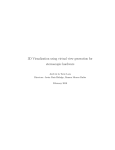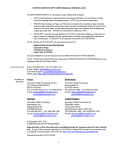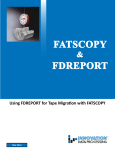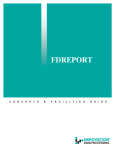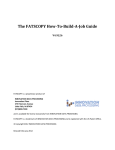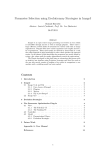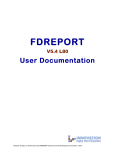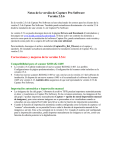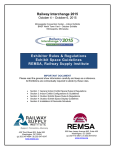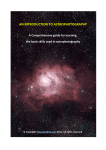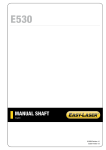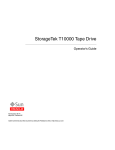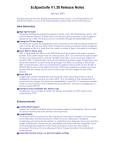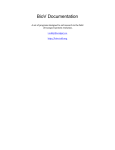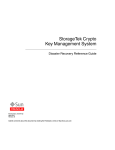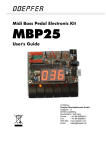Download share 2015 - Innovation Data Processing
Transcript
SHARE in Seattle The Benefits of using FATSCOPY for EMC DLm tape migration Session 17012 Speakers: Deb McCarty, EMC Tom Meehan, INNOVATION Data Processing Walgreens Experience Insert Custom Session QR if Desired. Executive Summary ™ FATSCOPY ™ The ONLY Tape Migration Tool Tape Kit you will ever to need! Migration Brings balance EMC DLm to DLm Learn tape what’s migration new in the FATSCOPY And now... FATSCOPY DLm Migration Tool Kit INNOVATION and EMC DPAD frommake INNOVATION it even easier DATA for you PROCESSING to order an EMC Professional Services DLm Migration Engagement using FATSCOPY with a single signature agreement Agenda FATSCOPY and EMC DLm Migration o Executive Summary o EMC DLm Overview o FATSCOPY Overview o FATSCOPY EMC DLm Migration o Customer Experience Executive Summary FATSCOPY ™ The ONLY Tape Migration Tool Kit you will ever need! Brings balance to DLm tape migration And now... INNOVATION and EMC DPAD make it even easier for you to order an EMC Professional Services DLm Migration Engagement using FATSCOPY with a single signature agreement EMC Disk Library for Mainframe Typical Mainframe Tape Workloads Backup • 3390 DASD volume dumps All Wit – Fixed size volumes – 3, 9, 27, and 54 GB • z/OS leading backup applications – FDR—Innovation Data Processing – DSS—IBM • DB2 Image Copies Space Mgmt • IBM’s HSM • CA/Disk (DMS/OS) h• FDR/ABR Diffe Data Archive • Fixed content data – Check images, etc. – Variable data Work Tape • Short retention— temporary datasets • High read/write requirements leading archive rent R • z/OS • Migrates data between efapplications erence • Example: Syncsort different storage Pattework files classes r ns • Transaction log files – ASG-ViewDirect – IBM ImagePlus • Meant to conserve DASD usage • Can use significant CPU cycles • SMF data files • Large sequential files Typical Mainframe Tape Solution Backup Space Mgmt Work Tape Data Archive IBM z/OS mainframe Physical tape Virtual tape You would need two or three different tape platforms (and code bases) to satisfy the needs of all workloads Deduplication EMC Mainframe Tape Solution Space Data MgmtArchive Virtual tape Work Backup Tape IBM z/OS mainframe Backup Physical tape Space Mgmt Data Archive EMC DLm8100 EMC satisfies the needs of all tape workloads in a single, manageable solution Deduplication Work Tape Why go virtual for mainframe tape? Eliminate physical tape media o DLm scalability enables customers to go completely “tapeless” o Risk mitigation to avoid litigation and public embarrassment due to lost or stolen media Consistent performance o Single tier of storage eliminates the need to de-stage and re-stage tape volumes to and from tape o Instant tape mounts coupled with high-speed locate for disk-like response time regardless of the age of the tape dataset Why DLm for mainframe tape? Breakthrough disaster recovery o Read / Write Point-In-Time copies enable fully destructive disaster recovery testing without compromising production replication o Superior availability o Microcode updates and corrective maintenance activities are performed concurrently without the need to interrupt tape operations o Integrated data de-duplication capability o Inline data de-duplication improves storage efficiencies and reduces data replication bandwidth requirements Questions? FATSCOPY Overview The ONLY DLm Tape Migration Tool Kit you will ever need! Move Multiple Cartridge Tapes – or – Virtual Tape Volumes - to DLm with or without deduplication FATSCOPY with IMAGE Copy and Integrated Support for ASG Zara, CA-1, CA-TLMS, and IBM DFSMSrmm makes migration to an EMC DLm Simple to plan, Easy to do, and Fast to complete. FATSCOPY: A Record of Continual Improvements based on direct feedback from Customers and VARs like EMC Professional Services Summary of Modifications – Version 4.9 Level 29 (Jan 2015) o Adds support for the ASGZara (Automated Tape Management System) o IMAGE Copy DLm migration now supports CA-1, CA-TLMS, IBM-RMM and ZARA o Adds “Guided Path” ISPF Panels to make FATSCOPY even easier to use Summary of Modifications – Version 4.9 Level 28 (Q4 2013) o Adds IMAGE Copy support for CA-TLMS further simplifies migration to DLm o New consolidated log simplifies auditing a migration o z/OS system logger allows multiple FATSCOPY jobs to concurrently write to a single log Summary of Modifications – Version 4.9 Level 27 (Q1 2013) o Adds IMAGE Copy support for RMM and CA-1 simplifies migration to DLm o New parameter simplifies specifying range of volumes when copying all datasets on a volume Summary of Modifications – Version 4.9 Level 26 (Q1 2012) o New options keep FATSCOPY running even when RMM housekeeping is running o RESTART for a FATSCOPY migration after an ABEND or operator CANCEL o Copy the physical backend volumes in a tape-backed VTS Types of FATSCOPY Copies Physical Volume Copy – fastest & most efficient o IMAGECOPY Copies entire input tape volume & its VOLSER to an output tape volume. Logical Dataset Copy – powerful & most flexible o ALLDSN Copies all datasets on input volume to an output tape with a new VOLSER. o CATDSN Copies selected cataloged datasets to an output tape with a new VOLSER. Physical Volume Copy – fastest & most efficient – Easiest fastest & most efficient way to migrate to an EMC DLm Employs a unique DLm facility to recognize a VOLSER change o IMAGECOPY o Selecting volumes from CA-1, CA-TLMS, IBM-RMM or ZARA o Using fully-qualified volume serial numbers or ranges o Copies entire input tape volume & its VOLSER to new volume o Producing an exact block-for-block copy of the input volume o Invokes DLm facility to recognize the VOLSER change o Updates CA-1, CA-TLMS, IBM-RMM or ZARA & z/OS TCDB o Ensuring z/OS can mount the migrated volumes o Especially useful for copying tapes created by applications with an external data base that records relative block & VOLSER, like OAM, Mobius and UPSTREAM o Avoids significant time needed to update those external data bases Logical Dataset Copy – powerful & most flexible – Powerful, flexible and easy way to select and stack datasets on new higher-capacity tape or on new types of tape media. o ALLDSN o Selecting volumes from CA-1, CA-TLMS, IBM-RMM or ZARA o Using fully-qualified volume serial numbers or ranges o Copies all the datasets from one, or more input volumes, to an output tape volume with a new VOLSER o Updates CA-1, CA-TLMS, IBM-RMM or ZARA, z/OS TCDB & Catalog o Ensuring z/OS can find the migrated datasets o CATDSN o Selecting datasets from z/OS catalog o Using fully-qualified cataloged data set names or masks o Copies the selected datasets from one or more input volumes to an output tape volume with a new VOLSER o Updates CA-1, CA-TLMS, IBM-RMM or ZARA, z/OS TCDB & Catalog o Ensuring z/OS can find the migrated datasets FATSCOPY Includes... FDREPORT a Migration Planning Tool Easily query the RMM or CA-1 tape management data base using a broad range of powerful selection parameters. Create reports to determine which volumes you need to copy. FDREPORT is available at no charge to FATSCOPY customers for duration of a migration! Use FDREPORT to Plan your FATSCOPY Migration to a DLm Find out how many of your tapes are o Active o In scratch status o Controlled by an External Data Manager (OAM, Mobius and UPSTREAM) Generate reports from a CA-1 or IBM-RMM tape management data base o List Volumes Not In Scratch Status o List “Active” Volumes & their Data Sets i.e. Not Expired (In Volser Order) o Total Number of Volumes - In Scratch Status - Not In Scratch Status o Approx Size of all “Active” Data Sets i.e. Not Expired & Not Scratch o Approx Size of all expired datasets on volumes not in Scratch Status Create a portable extract from the tape management data base o Work remotely can generate reports on any system Generate scratch volume lists as input to the DLm scratch utility and release disk space backing the logical tape volumes that are in scratch status. Always Easy-to-Use Fast and Efficient Specify volumes for DLm IMAGECOPY migration o Tape volume serial numbers or ranges As well as Powerful and Flexible Select data sets to be copied by specifying: o Fully-qualified or masked cataloged data set names o Tape volume serial numbers or ranges Then filter the volumes and data sets to be copied based on o creation date o expiration date o creating job name o dataset size o last used program o creating program o And more New FATSCOPY Guided Path makes it even easier to manage a DLm migration Guided Path leads you through Selection Criteria Guided Path steps you through the processof building a batch job by asking you questions about the task you want to accomplish: Use SIMULATION to validate the migration plan and save the output Plan to save the results of the Simulation Chose a Range of Volumes to Migrate Selection by Volume Range Define Volume Range Use Global Default Options to make individual job set up simpler Let Global Default Options Make IMAGECOPY Set Up Easy IMAGECOPY “Options” include Volume Exclusion Default takes all Excluding volumes is an option Save Different Simulation Results Save different selection criteria results Use FATSCOPY Simulation Results to Verify the Tape Migration Plan SIMULATION Shows which VOLUMES (“in a pull list”) will be selected for migration and which datasets will be selected for copying Build the actual migration job using the FATSCOPY Simulation Criteria Build the FATSCOPY Migration Job Using the Simulation Criteria that you chose Manage the FATSCOPY DLm Migration Using ISPF panels create FATSCOPY JCL and submit FATSCOPY jobs Consider Create & Submit one large FATSCOPY job, with a CHECKPOINT DSNTABLE DD o STOP the job with a console command at the end of daily processing or whenever o Pick up where you left off, the next day or whenever, using the RESTART keyword Submit the DLm Migration Job Notegoing to a DLm Create the FATSCOPY job with the Guide Path Panels Verifiy the migration criteria with a Simulation Submit a “RESTART” job using that same criteria Validate the Migration using FATSCOPY Audit Tools Audit Reports Plan to have FATSCOPY write audit records for an overall summary report with optional detail Audit Reports Let You Verify What You Actually Did FATSCOPY writes audit records, to a sequential file or the system logger file, to show an overall summary and list information for each data set copied During the Migration Examine, Verify, Recover and Repair with FATAR a powerful companion utility to o o o o Examine tape formats, labels and specific record fields Verify questionable content or missing data Recover copy & correct tapes found to have data checks Repair copy a tape o applying user-specified modifications o drop data blocks that cause errors A customer who used FATAR to recover data from damaged SMF log tapes wrote “It was very important to have a full month’s worth of SMF data available to feed into the IBM Sub-Capacity Reporting Tool. Without that data, we could have ended up paying at least $2500 more for November’s IBM software monthly maintenance charges.” After the Migration Erase corporate and customer data left on old tapes Use the companion utility FATS/ERASE to... o Securely erase all company confidential & personal customer data from z/OS tapes before they leave a site or before internal re-use. o Quickly erase individual 3480 tapes in under 2 minutes, 3490Es under 4 minutes and 10GB 3590s in under 20 minutes, erasing as many tapes concurrently as there are available tape drives. o Safely always erase “residual data” on any tape leaving your control, without destroying the current data on the tape. o “residual data” is unrelated to the most currently written data on a tape. It is data written during a previous use which is now beyond the current “end of tape marker”. It may be of a sensitive nature and should always be deleted before a tape is allowed to leave a site. FATSCOPYThe ONLY DLm Tape Migration Tool kit you’ll ever need! o FATSCOPY Tape Migration to EMC DLm from IBM 3480, 3490, 3590, TS1120/1130/1140, TS7700, MF-VTSM STK/ORACLE T10000A/B/C,VSM CA-VTAPE. o Fast and Efficient block by block physical IMAGECOPY to same VOLSER. o Integrates with ASG-Zara, CA-1, CA-TLMS & IBM DFSMSrmm. o Plan RMM and CA-1 DLm migrations with FDREPORT. o SIMULATE to Verify what FATSCOPY will be migrating. o AUDIT to create a record of what FATSCOPY did migrate. o FATAR to recover damaged tapes and tapes with data checks. o FATS/ERASE to securely and quickly erase tapes before disposal. Questions? Successful FATSCOPY Migrations to EMC DLm Under CA-1 Tape Management o Large US retail pharmacy chain o Large UK retailer o Large UK bank migrating 1.3 PB of data from IBM 7740 & STK SL8500 Under CA-TLMS Tape Management o Large US electronic & mechanical products manufacturer o Large US brokerage firm migrating 1 PB from STK VSM, 9840 & CA-VTAPE Under IBM DFSMSrmm Tape Management o Large US grocery and foodservice supply chain provider Under ASG Zara Tape Management o Large US financial holding company User experience Gloria L. Kelber Enterprise Systems Storage Management Who is Walgreens? o The Walgreen Company (Walgreens) is the largest drug retailing chain in the US. o Founded in Chicago, in 1901, as of 2014, Walgreens had 8,206 drugstores. “ o Walgreens services more than 8,000,000 (8 million) customers daily. o Fortune magazine ranks Walgreens 37th overall in revenue ” among U.S. Companies. Who is Walgreens? o Walgreens offers customers multichannel access to costeffective pharmacy, health and wellness services and advice. o In the 1920s, a time when retailers were seeing the beginnings of the Great Depression and alcohol was illegal as a “result of Prohibition, Walgreens which sold prescription whiskey was growing. o Today, Walgreens is taking its products and services to the four corners of the earth” as part of the Retail Pharmacy USA division of Walgreens Boots Alliance, Inc., the first global pharmacy-led, health and well-being enterprise in the world. Who is Walgreens? o Walgreens runs a z114-PO2 with 4 LPARs and CA-1 tape management. “ ” What problems did Walgreens face? o A need to refresh & consolidate multiple kinds of Tape Storage technology. o Had 2 different CA-1 TMC’s controlling approximately 450,000 tape volumes. o Desire to accomplish the tape technology refresh o in the shortest period of time o without having to call on Business Application Units o using a single LPAR with dedicated tape units o replicate the DLm tape volumes to a secondary site for business continuance Why did these problems exist? o Walgreens had four different incompatible types of tape technology o 90,000 3490 tapes o 80,000 3590 tapes o 230,000 VTS tapes o 50,000 NL z/VM tapes o External applications data bases containing meta data about tapes they create. o ASG VIEW DIRECT (Mobius) maintains its own external tape data base o Need for a better business continuance solution How did Walgreens come to consider FATSCOPY? o Walgreens was familiar with the reliability and speed of INNOVATION solutions o FATSCOPY o Proved to be fast, reliable and extremely easy to use. o Supports CA-1 & z/OS BTLS (Basic Tape Library Sys) without need for DFsms. o Has accompanying tools to help estimate the migration effort. How did Walgreens come to consider FATSCOPY? o Has simulation tools to help validate the migration will work the way you want. o Is recognized by ASG for its ability to make exact IMAGE copies of Mobius tapes. o Eliminates the need to externally update View Direct (Mobius) tape data base. What benefits did Walgreens come to realize? o Biggest benefit of FATSCOPY is the ability to migrate all tapes with a single tool o 90,000 3490 tapes have all been copied o 80,000 3590 tapes have all been copied o VTL tapes are currently being migrated o SIMULATION ensured multi-volume datasets were copied together and in sequence. o IMAGECOPY made exact IMAGE copies of ASG Direct View Mobius tapes o No need to engage Business Application teams & negotiate for data base reorgs. o Saves aggravation and helps complete the migration in minimal time. What benefits did Walgreens come to realize? o “Successfully processed our first Disaster Recovery test, using the DLm.” o “Using the DLm for Disaster Recovery/Business Continuity saves both time & money, no need to store or ship physical tapes that may be lost or damaged in transit, since we replicate to an offsite DLm, the information is readily available and we were able to bring up our 4 Production LPARs in a very short period of time.” Questions? FATSCOPY Resources Use these links to download the current FATSCOPY product documentation from the INNOVATION DATA PROCESSING website. o FATS, FATAR, FATSCOPY User Manual http://www.fdr.com/Manuals_CurrentVersion/FATSCOPY_V49L29_January_5_2015.pdf o FATSCOPY How-To-Build-A-Job Guide http://www.fdr.com/Manuals_CurrentVersion/FATSCOPY_How-To-Guide_V49L29_January_5_2015.pdf o FATSCOPY Quick Start Guide http://www.fdr.com/Manuals_CurrentVersion/FATSCOPY_Quick_Start_Guide_V49L29_January_5_2015.pdf o FATSCOPY Concepts & Facilities Guide http://www.fdr.com/concepts/FATSCOPYCFG/index.html o FATSCOPY Product Demo http://www.fdr.com/portfolio/products/demo.cfm And the most important resource: Us! FATSCOPY support promptly provided by the product developers. Thank you!



















































